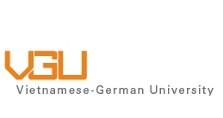VGU Opens Vietnam’s Doors to World Economic Standards

Looking to make a name in the international economic environment in the near future, Vietnam will make heavy investments to improve its quality of education and is working on putting up several international standard universities by 2025, of which will hopefully rank among the world's top 200 universities. When that is accomplished, it will also set higher standards for other institutions in the country.
Just August of this year, an agreement was signed between the State Bank of Vietnam and the World Bank (WB) to fund the German-standard University which is to be built at a cost of US$200 million. $20 million USD will come from the Vietnamese government, the entire budget of which is to develop infrastructure facilities as well as build a policy framework to make the Vietnam-Germany University a leading technology training and research centre in Vietnam, meeting regional and international standards. It is expected to be completed for the 2016-2017 school year. This investment aims to emulate the scientific know-how of Asian economies like its neighbors in the region, Taiwan and South Korea. The construction of the university will make available faculties specialized in electric and information technology, civil engineering, bio-technology, economics and industrial technology, computer science and natural science. The financial assistance from the World Bank was greatly appreciated as it is a big push to strengthen the country’s education capacity and development, especially tertiary education.
The project takes place in close collaboration with a group of German experts. The government of Germany will finance the development and implementation of teaching programs and cover expenses for its lecturers who will teach at the university. Under VGU’s charter, it will employ its faculty and design its own courses. By focusing on applied sciences and undertaking research, in collaboration with private industry, it resembles German universities, its principal backers.
Unswayed by Criticisms
For Critics, it is unclear how spending more on education can produce a suitably skilled workforce. They believe that more important issues like outdated pedagogy, low pay, and stifling political orthodoxy should be looked into first.
As to VGU’s move to break from the traditional mold and implementing its autonomy, analysts also foresaw several drawbacks as private academies have recently mushroomed without proper oversight. Such research is also seen too expensive and requires sustained public or private funding. In its start-up phase, VGU gets most of its revenues from federal and state governments in Germany. Students pay $1,500 a year, and around 60 percent receive financial aid. Vietnam's government contributes $500,000 a year to its budget. Eventually, Vietnam must have to shoulder the burden. By 2030, the university's budget is projected to reach $57 million.
But for Victoria Kwakwa, the country director for the World Bank, and is among those who made the $180 million funding of the VGU campus possible, says it and other autonomous institutions should be seen not as islands of excellence. "Its success will be important in demonstrating that you can run higher education in a different way," she says.
VGU's president, Wolf Rieck, emphasizes that if the country wants to have an excellent research university, then they must be willing to pay those people who do the research on a competitive level. This could be a huge move for the country to lure back overseas-educated PhD students to teach, the same strategy that China is also pursuing. Since Vietnam can't currently match the salaries offered in the West, it needs to create an environment in which a promising scientist or engineer can shine, while nurturing future thinkers.
VGU’s role in educating qualified computational engineers will help accomplish such vision. If its success is ensured, the new university will be a landmark which is on its way to becoming a leading technological research university in the region.









